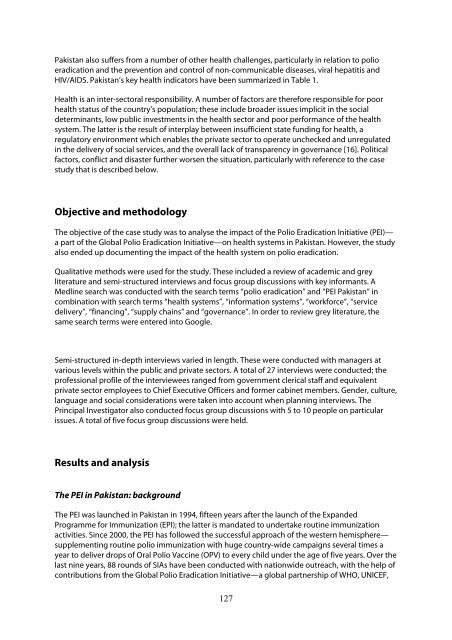MAXIMIZING POSITIVE SYNERGIES - World Health Organization
MAXIMIZING POSITIVE SYNERGIES - World Health Organization
MAXIMIZING POSITIVE SYNERGIES - World Health Organization
You also want an ePaper? Increase the reach of your titles
YUMPU automatically turns print PDFs into web optimized ePapers that Google loves.
Pakistan also suffers from a number of other health challenges, particularly in relation to polio<br />
eradication and the prevention and control of non-communicable diseases, viral hepatitis and<br />
HIV/AIDS. Pakistan’s key health indicators have been summarized in Table 1.<br />
<strong>Health</strong> is an inter-sectoral responsibility. A number of factors are therefore responsible for poor<br />
health status of the country’s population; these include broader issues implicit in the social<br />
determinants, low public investments in the health sector and poor performance of the health<br />
system. The latter is the result of interplay between insufficient state funding for health, a<br />
regulatory environment which enables the private sector to operate unchecked and unregulated<br />
in the delivery of social services, and the overall lack of transparency in governance [16]. Political<br />
factors, conflict and disaster further worsen the situation, particularly with reference to the case<br />
study that is described below.<br />
Objective and methodology<br />
The objective of the case study was to analyse the impact of the Polio Eradication Initiative (PEI)—<br />
a part of the Global Polio Eradication Initiative—on health systems in Pakistan. However, the study<br />
also ended up documenting the impact of the health system on polio eradication.<br />
Qualitative methods were used for the study. These included a review of academic and grey<br />
literature and semi-structured interviews and focus group discussions with key informants. A<br />
Medline search was conducted with the search terms “polio eradication” and “PEI Pakistan” in<br />
combination with search terms “health systems”, “information systems”, “workforce”, “service<br />
delivery”, “financing”, “supply chains” and “governance”. In order to review grey literature, the<br />
same search terms were entered into Google.<br />
Semi-structured in-depth interviews varied in length. These were conducted with managers at<br />
various levels within the public and private sectors. A total of 27 interviews were conducted; the<br />
professional profile of the interviewees ranged from government clerical staff and equivalent<br />
private sector employees to Chief Executive Officers and former cabinet members. Gender, culture,<br />
language and social considerations were taken into account when planning interviews. The<br />
Principal Investigator also conducted focus group discussions with 5 to 10 people on particular<br />
issues. A total of five focus group discussions were held.<br />
Results and analysis<br />
The PEI in Pakistan: background<br />
The PEI was launched in Pakistan in 1994, fifteen years after the launch of the Expanded<br />
Programme for Immunization (EPI); the latter is mandated to undertake routine immunization<br />
activities. Since 2000, the PEI has followed the successful approach of the western hemisphere—<br />
supplementing routine polio immunization with huge country-wide campaigns several times a<br />
year to deliver drops of Oral Polio Vaccine (OPV) to every child under the age of five years. Over the<br />
last nine years, 88 rounds of SIAs have been conducted with nationwide outreach, with the help of<br />
contributions from the Global Polio Eradication Initiative—a global partnership of WHO, UNICEF,<br />
127

















